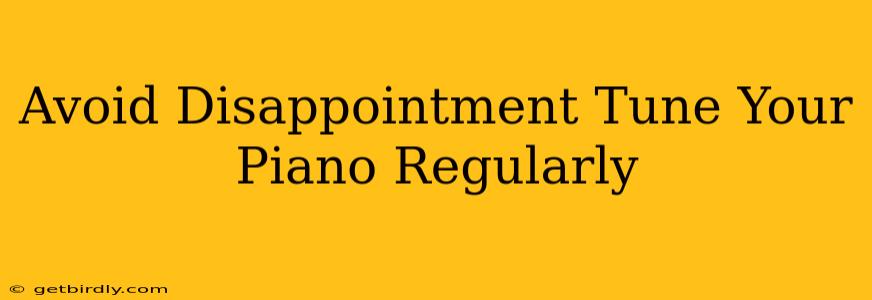Avoid Disappointment: Tune Your Piano Regularly
A piano, whether a grand concert instrument or a humble upright, is a complex machine that requires regular maintenance to perform at its best. Ignoring this crucial aspect can lead to significant disappointment, affecting both your playing experience and the instrument's longevity. This article will explore the importance of regular piano tuning, addressing common questions and concerns.
Why is Regular Piano Tuning Important?
Consistent tuning prevents the gradual drifting of pitches that occurs naturally over time. Changes in temperature and humidity significantly impact the tension on the strings, causing them to stretch or contract. This results in an instrument that's increasingly out of tune, affecting intonation, making playing frustrating, and potentially damaging the piano's internal structure over time. A well-tuned piano offers a more pleasing and accurate sound, enhancing your enjoyment and musical expression.
How Often Should I Tune My Piano?
The recommended tuning frequency depends on several factors, including the age of the piano, its usage frequency, and the environmental conditions. However, a good rule of thumb is to have your piano tuned at least once a year. If your piano is new, frequently used, subjected to significant temperature fluctuations, or located in a particularly humid or dry environment, you might need to tune it more often—perhaps twice a year.
How Often Should I Tune My Piano if I Play It Frequently?
For pianists who practice extensively, twice-yearly tuning is often recommended. The constant stress on the strings from regular playing accelerates the rate at which the piano goes out of tune. This proactive approach ensures the instrument remains in optimal playing condition.
How Often Should I Tune My Piano if It's Rarely Played?
Even if your piano sits mostly unused, annual tuning is still advised. Environmental factors alone will cause the piano to drift out of tune over time. Regular maintenance prevents significant pitch deviations and avoids potential internal damage.
What Happens if I Don't Tune My Piano Regularly?
Neglecting regular tuning can lead to several problems:
- Poor intonation: The piano will sound unpleasant and inaccurate, affecting your ability to play in tune and potentially hindering your musical progress.
- Increased stress on the piano's internal structure: Uneven string tension can strain the soundboard, bridges, and other components, potentially leading to costly repairs or even irreparable damage.
- Frustration and reduced enjoyment: Playing an out-of-tune piano is simply not enjoyable. It can lead to frustration and a decreased motivation to practice or play.
How Much Does Piano Tuning Cost?
The cost of piano tuning varies depending on your location and the tuner's experience. It's advisable to get quotes from several qualified tuners to find a price that suits your budget. Remember, however, that investing in regular tuning is a cost-effective way to protect your investment and ensure your piano's longevity.
How Can I Find a Qualified Piano Tuner?
Finding a reputable piano tuner is crucial. You can usually find recommendations through local music stores, music teachers, or online searches. Look for tuners who are members of professional organizations, as this often indicates a commitment to high standards and ongoing training.
Can I Tune My Piano Myself?
While there are some DIY tuning tools available, it's strongly recommended to leave piano tuning to a professional. Improper tuning can cause serious damage to your instrument. A qualified tuner possesses the expertise, tools, and experience to tune your piano safely and effectively.
By prioritizing regular piano tuning, you invest in the health and longevity of your instrument, ensuring many years of musical enjoyment. Don't let a neglected piano diminish your playing experience; schedule a tuning appointment today.

